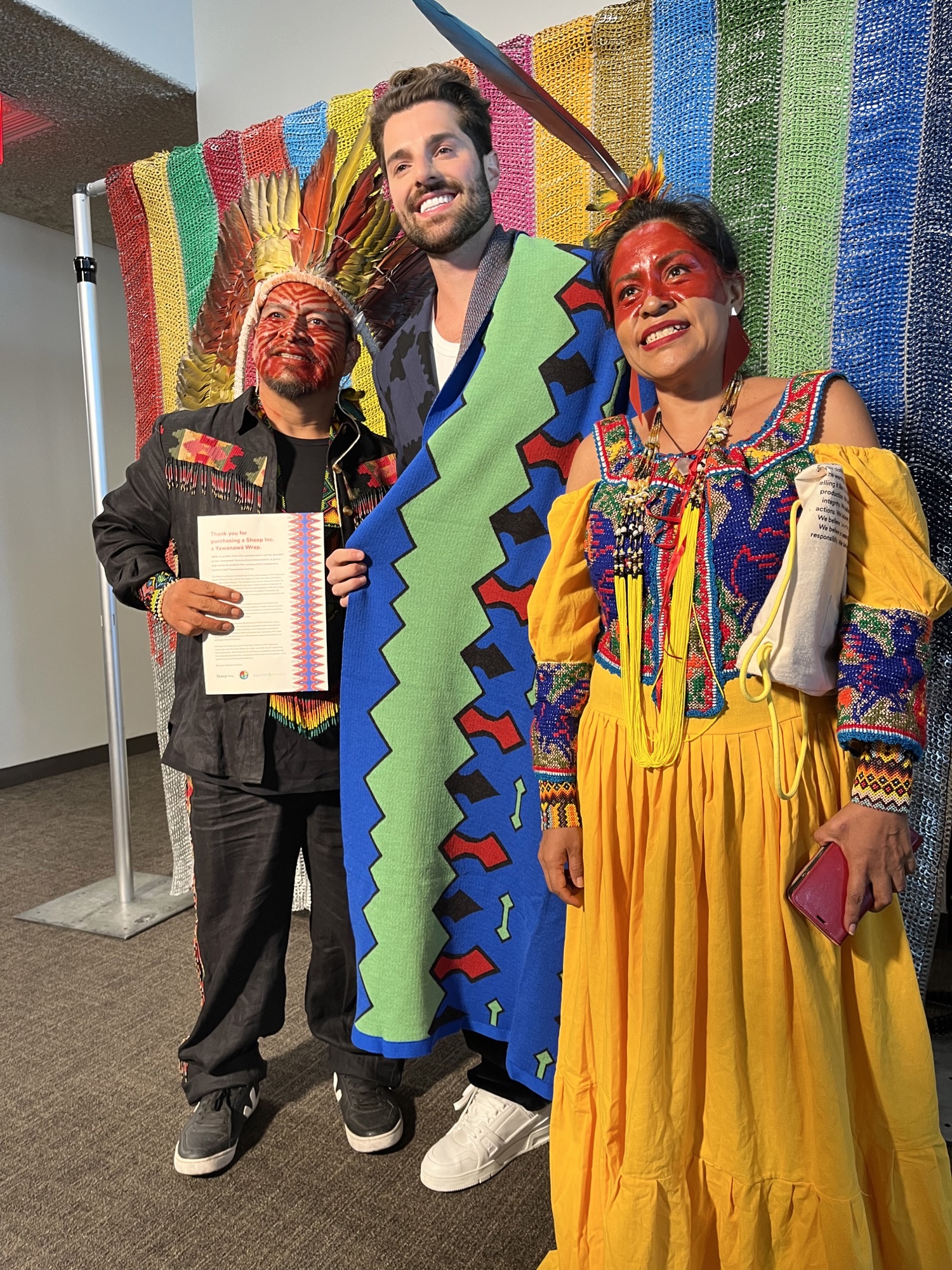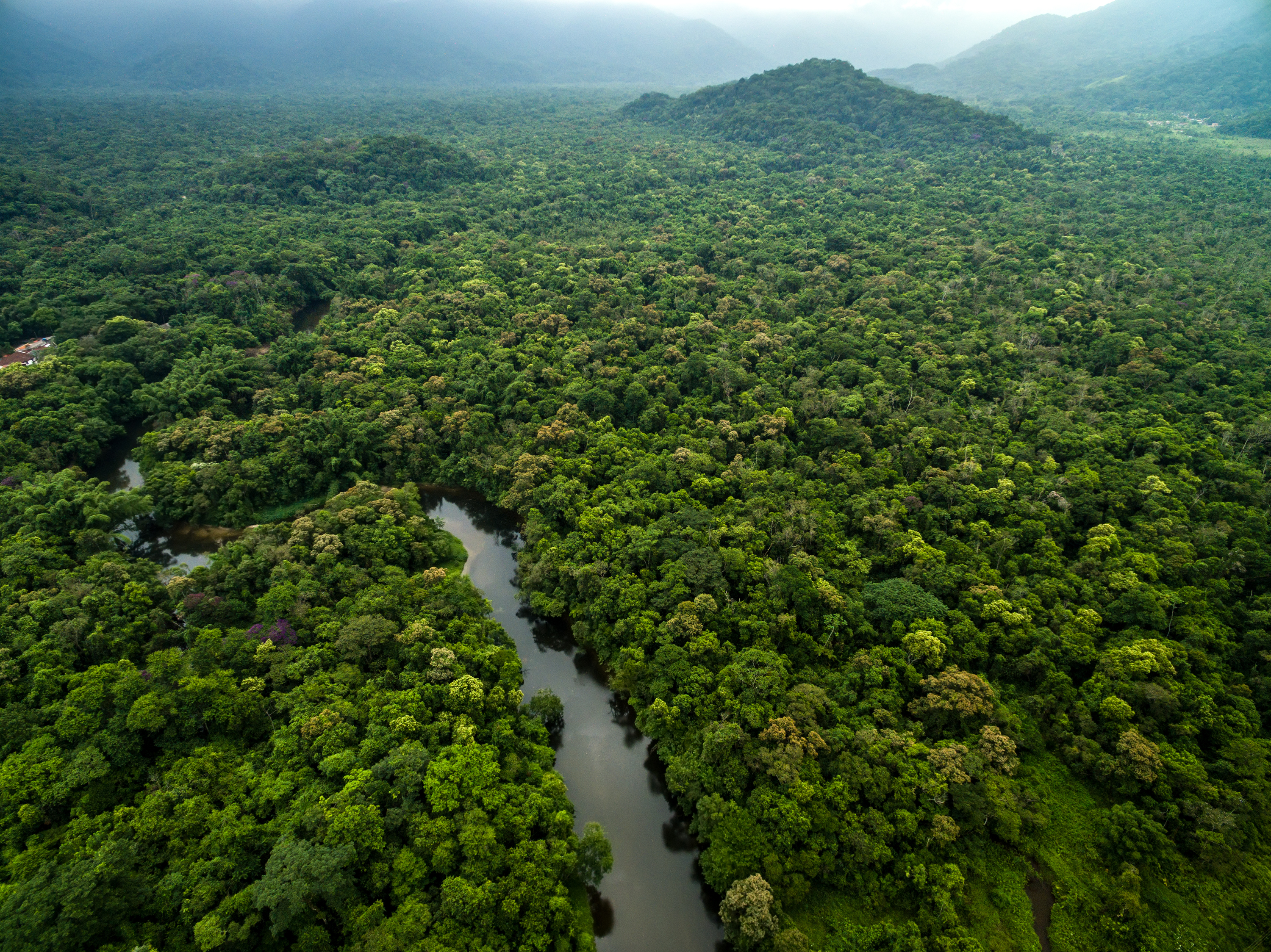
This initiative emphasizes the pivotal role of Indigenous people in the climate, biodiversity, and sustainable agenda.
By Anna Giulia Medri – Programme Management and Partnerships Advisor, UNDP Equator Initiative
On August 2022, International Day of the World's Indigenous Peoples, the Sheep Inc. x Yawanawá sustainable fashion collection was launched. This distinctive limited-edition collection from a collaboration between the Yawanawá Indigenous community of the Land of Rio Gregório in the Acre State of Northern Brazil, and Sheep Inc. - the first carbon negative clothing brand looking to “create the blueprint for the garment industry to change its ways and to bring us back in touch with where our clothes come from”.
Facilitated by the UNDP Equator Initiative, this partnership aligns with UNDP’s commitment to promote initiatives from Indigenous peoples that demonstrate exceptional achievements insustainable development. The partnership is also part of the UNDP’s “Making Sustainability a Fashion Statement” campaign in 2021, to move beyond advocacy and demonstrate tangible sustainable approaches. Those approaches can also be inclusive and contribute resources to those safeguarding the richest and most biodiverse lands on Earth – Indigenous peoples and local communities.

The Equator Initiative brings together the United Nations, governments, civil society, businesses. and grassroots organizations to recognize and advance sustainable development for people, nature and resilient communities.
Fashion, one of the largest manufacturing industries, contributes about 10 percent to carbon emissions. Recognizing Indigenous peoples and local communities as the most effective custodians of their lands, this collaboration emphasizes their pivotal role in the climate, biodiversity, and sustainable agenda.
The partnership aims to transform obsolete business models and supply chains by emphasizing inclusion, transparency, and circularity. It highlights how mindful, modern fashion companies can reduce carbon emissions through a carbon-negative process that starts with regenerative agriculture and ends with channeling back revenues to the Indigenous peoples behind the Yawanawá Sociocultural Association (ASCY) which protects over 200,000 hectares of Amazon forest.

UNDP's partnership between Sheep Inc. and the Yawanawá Sociocultural Association demonstrates how sustainable fashion business models can channel funds back to where raw materials where sourced such as the Amazon.
All the profits from the fashion collection were donated to the ASCY, which embodies a holistic understanding of the relationship between land and ecosystems.
“ASCY is an Indigenous organization representing 13 Yawanawá communities and our purpose is to protect our territory and sustainably manage our forest to develop economic sustainable projects and create income-generating opportunities that will benefit the Yawanawá. Revenues from this project are used for activities for the Yawanawá youth, to grow and empower the next generation



The Sheep Inc. goal is carbon negative emissions – a process that extends from suppliers to manufacturers.
“Our knitwear uses 100 percent ZQ certified merino wool sourced exclusively from New Zealand sheep stations leading regenerative farming and,using innovative land management, feeding, and grazing techniques to capture more CO2 than their operations emit, making both their properties and the wool they produce, carbon-negative. Our commitment extends to carbon-neutral knitting through solar power and renewable energy. Our warehouse is the UK's first carbon-neutral fulfillment site with an A+ EPC Energy rating and an Excellent BREEAM rating.” – Michael Wessely, Sheep Inc.

Sheep Inc. uses zero-waste knitting machines that run on renewables to manufacture their products.
Sheep Inc. believes that focusing on regenerative farming is a crucial first step. Its farm plants multi-species pastures with over 30 different seeds, ensuring every plant has a role in nourishing both livestock and soil. Unlike traditional agronomy focusing on chemicals, regenerative agriculture emphasizes biology.
“Soil, often overlooked, plays a crucial role in the farming system. A UN report suggested that if we increase by 0.4 percent a year the quantity of carbon contained in soils, we will bring carbon levels in the atmosphere to what they were before the industrial age. Through regular testing, one of our farms discovered that in a year they can sequester one percent in soil carbon. Regenerative agriculture can play a huge part in solving the climate crisis.” - Edzard van der Wyck, Sheep Inc.

Sheep Inc. sources from farms that adopt regenerative farming that sequesters more CO2 than is produced.
The Sheep Inc. x Yawanawá collection features traditional drawings made by the Yawanawá youth community. Workshops with the community’s young people were made possible with Insituto Alok support.
The Yawanawá artworks narrate the cultural and spiritual legacy of the Yawanawá people — from representations of different Jiboia and Sukuri snakes that manifest in the form of guides in Yawanawá Uni Medicine ceremonies, to the wings of the Awavena butterfly that carries the feminine spiritual power. Each symbol and traditional drawing provided by the community’s young people was then interpreted by Sheep Inc.'s designer, Alexander Lewis and used for the limited Sheep Inc. x Yawanawá collection.
“All designs come from the Yawanawá cosmovision and connection with Mother Earth, with the Jiboia symbolizing attraction and protection, the Sukuri snakes representing light, and the Awavena butterfly symbolizing protection for our people and humanity.” – Tashka Yawanawá


The Sheep Inc. customer is one who truly cares about the planet, or someone who’s simply looking to purchase beautifully crafted knitwear and who’s open to learning more about the impact of the fashion industry on the planet.
“In the fashion context, the main challenge has been to see Indigenous designers’ proprietary rights respected whenever their artworks were used by companies. Countless times our proprietary rights haven’t been respected and our artworks and designs taken without permission. We are so grateful for having found, through UNDP, a trustworthy company that has our same vision and mission. Looking ahead, we hope to see more examples of partnerships like this one.” - Laura Yawanawá

Laura Yawanawá expects that the partnership with UNDP will help set the example that Indigenous designers’ proprietary rights should be respected.

 Locations
Locations



